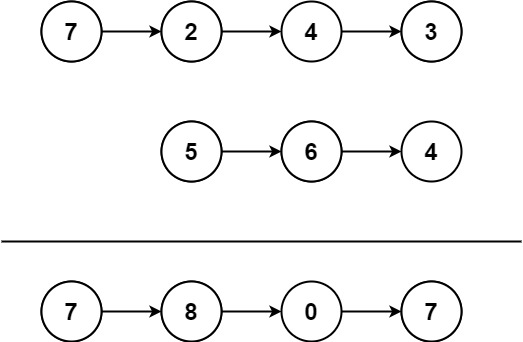Add Two Numbers II
Problem Statement - link #
You are given two non-empty linked lists representing two non-negative integers. The most significant digit comes first and each of their nodes contains a single digit. Add the two numbers and return the sum as a linked list.
You may assume the two numbers do not contain any leading zero, except the number 0 itself.
Examples #
Example 1:

Input: l1 = [7,2,4,3], l2 = [5,6,4]
Output: [7,8,0,7]
Example 2:
Input: l1 = [2,4,3], l2 = [5,6,4]
Output: [8,0,7]
Example 3:
Input: l1 = [0], l2 = [0]
Output: [0]
Constraints #
- The number of nodes in each linked list is in the range
[1, 100] 0 <= Node.val <= 9- It is guaranteed that the list represents a number that does not have leading zeros.
Solutions #
/**
* Definition for singly-linked list.
* struct ListNode {
* int val;
* ListNode *next;
* ListNode() : val(0), next(nullptr) {}
* ListNode(int x) : val(x), next(nullptr) {}
* ListNode(int x, ListNode *next) : val(x), next(next) {}
* };
*/
class Solution {
public:
ListNode* reverseRecursive(ListNode* head) {
if (!head || !(head -> next)) {
return head;
}
ListNode* node = reverseRecursive(head -> next);
head -> next -> next = head;
head -> next = NULL;
return node;
}
ListNode* addTwoNumbers(ListNode* l1, ListNode* l2) {
l1 = reverseRecursive(l1);
l2 = reverseRecursive(l2);
ListNode* up = new ListNode() ;
ListNode* down = new ListNode();
down->val = -1;
down->next = NULL;
up = down;
int carry = 0;
while(l1 != NULL || l2 != NULL){
int a=0,b=0,s=0,v=0;
if( l1!=NULL ) a = l1->val;
if( l2!=NULL ) b = l2->val;
s = a + b + carry;
v = s%10;
ListNode* temp = new ListNode();
temp->val = v;
carry = s/10;
down->next = temp;
down = down->next;
if(l1!=NULL && l1->next!=NULL)
l1 = l1 -> next;
else
l1 = NULL;
if(l2!=NULL && l2->next!=NULL)
l2 = l2 -> next;
else
l2 = NULL;
}
if(carry){
ListNode* temp = new ListNode(); ;
temp->val = carry;
down->next = temp;
}
up = reverseRecursive(up->next);
return up;
}
};